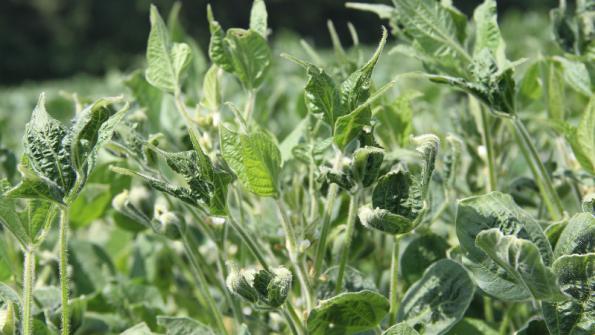
On Wednesday (Nov. 8) afternoon, the Arkansas Plant Board voted 10-3 to continue its plan to ban dicamba applications in 2018. If enacted, the ban would begin April 15 and run through the end of October, effectively removing the herbicide from use on Monsanto’s dicamba-tolerant (Xtend) crops during the growing season.
This summer, almost 1,000 off-target dicamba drift complaints were made to the Plant Board. Most complaints originated in east Arkansas, where row-crop planting is heavy. Nationally, the EPA claims over 3.5 million soybean acres were damaged by the herbicide this year.
As the season wore on, talk at the coffee shop evolved to question whether some damage could have come from the illegal application of older/generic dicamba formulations. Putting wind into sails of such concerns, BASF now says it sold only enough Engenia (one of the new dicamba formulations allowed to be spraying in the state) to cover around 50 percent of Arkansas’ 1.8 million Xtend acres.
At least part of the discrepancy can be attributed to growers who planted Xtend crops to protect themselves from drift threats on neighboring farms. In such defensive set-ups, farmers may never have sprayed dicamba on their acreage.
The board’s Wednesday vote came following a lengthy public hearing in Little Rock. The matter will now go to the executive subcommittee of the Arkansas Legislative Council.
Supporters of the ban point not only to the multitude of drift complaints, but to research done by university researchers showing dicamba – even in new formulations promised to be less prone to drift – is volatile and moves easily. Some farmers in the state unsuccessfully asked the board for any spraying cut-off to be later in the season, from mid- to late-May.
Exemptions
Exemptions for the dicamba spraying ban would include use in pastures, rangeland, turf, ornamental, direct injection for forestry, and home use.
“The plant board and the dicamba task force that preceded it made a decision based on the best evidence from land grant research conducted not only by the scientists of the University of Arkansas System Division of Agriculture, but also by their peers in Missouri, Tennessee, Indiana, and other states, and from additional information made available from all other sources,” said Mark Cochran, vice president-agriculture, for the University of Arkansas System, following the board vote. “We are proud of the work that our weed scientists and agronomists have done in service to the people of Arkansas and beyond.
“Our weed scientists and agronomists will continue to work diligently toward tools and techniques to help Arkansas farmers economically manage the challenge of resistant weeds.”
A day after the Plant Board decision where he spoke, Scott Partridge, Monsanto vice president of global strategies, told Delta Farm Press the board’s decision was a “predetermined outcome.”
Among his comments:
On the board’s decision…
“For the growers, I’m disappointed. They’ll once again have an important technology taken out of their hands.”
In 2017, Arkansas “had off-target movement and complaints of dicamba damage that was the equivalent of 60 percent of the other 33 (soybean-growing) states combined. That’s even though Arkansas only plants seven percent of the nation’s soybean crop.”
The company continues to complain about the “arbitrary nature of the Plant Board process. They ignored a tremendous amount of new information since they started down this path of a ban, including low-volatility formulations.”
What new information?
“New information about record yields in Arkansas – 51 bushels per acre. New information about the top crop conditions for soybeans in a decade. New information from BASF that they sold only enough of their low-volatility formulation (Engenia) to cover 52 percent of the dicamba-tolerant crops in the state. … New information about all the other analysis of off-target movement from other states that shows almost all of it is correctable by training and education.”
What approach would Monsanto prefer to prevent generic, or old, dicamba formulations from being applied to Xtend crops?
“The best way to prevent it is to have the entire system available to growers, to have the companion low-volatility formulation (Monsanto’s XtendiMax) be made available in the state of Arkansas. Investigation and enforcement is clearly the obligation of the state and they didn’t do a very good job last (season).”
On Monsanto’s next step…
“There’s a process to follow here that involves the (Arkansas) legislature and the governor. We’ve committed to the growers that we’ll do everything we can to accelerate that process. We’ll advocate they have a full set of tools available next year to choose which technologies, which chemistries, which seed, they wish to use.”
Partridge says the Plant Board has the ability to ask the legislative committee to act quickly on the proposed new regulations.
“We’re publically asking the Plant Board to accelerate the appeals and review process with us. I’d be very disappointed if the Plant Board slows the process down and doesn’t permit an immediate review.”
Does the Arkansas action portend similar steps in other states?
“I won’t suggest Arkansas is a bellwether in this regard. We have some of the best farmers in Arkansas but, unfortunately, there’s a political process that doesn’t set the standard for other states to follow. What Arkansas did last year wasn’t followed by the other 33 states. … We don’t expect other states to follow Arkansas.”
About the Author(s)
You May Also Like




